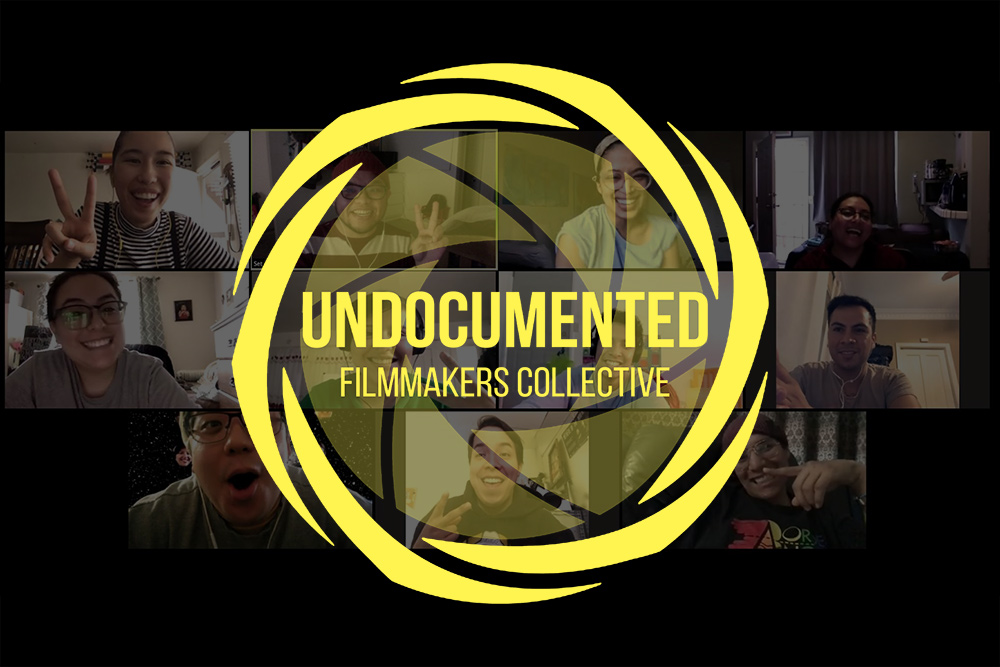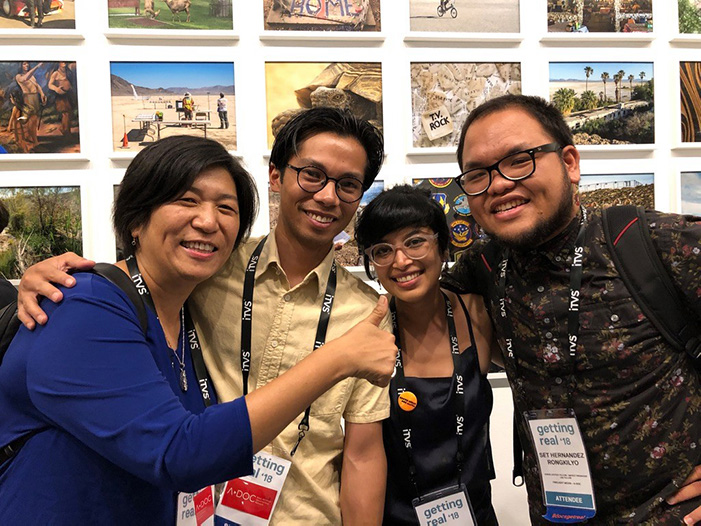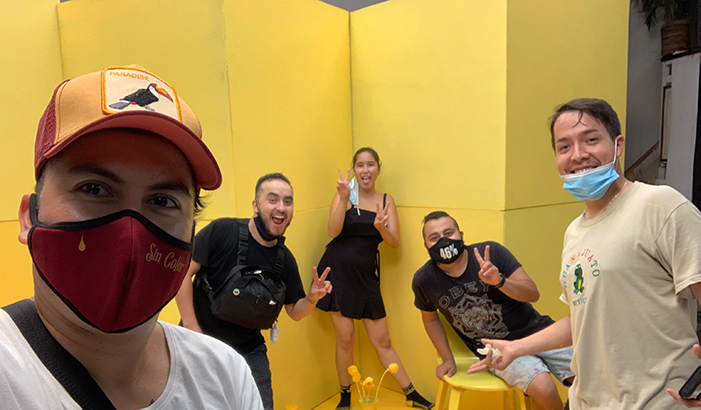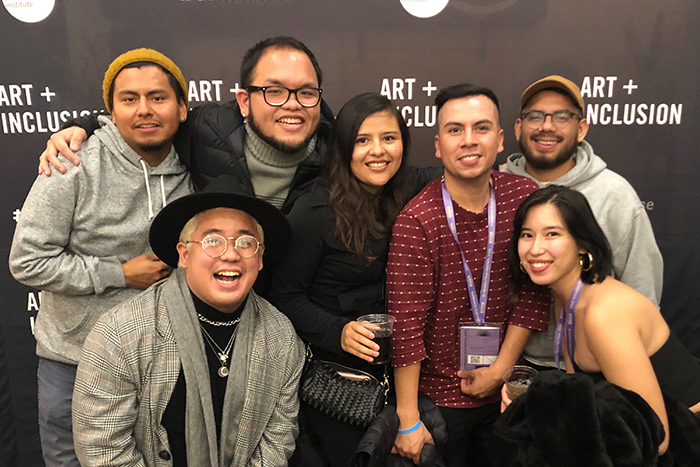
Imagine a space where filmmakers can discuss the issues they are facing in their careers and find a community of support. The Undocumented Filmmakers Collective (UFC) is that safe, inclusive space. “We're like roommates that are virtually living together,” says Set Hernandez Rongkilyo, co-founder of UFC and director of the documentary COVER/AGE, which he made in conjunction with California Immigrant Policy Center. Communicating from around the US, the group relies on Zoom calls to discuss pressing topics. “For the most part, sometimes we would have seven-hour Zoom calls,” Hernadez Rongkilyo elaborates. “We're literally just hanging out. Sometimes, we watch movies together. We have people in Durham, Los Angeles and New York joining. Really, we are so much more than just an organization.”
The collective is united in the foundational value of “elevation not competition” and centering the experience of the most directly impacted within the collective. “We are creating something radical, something in some way futuristic,” explains UFC Co-Founder Rahi Hasan. “We're practicing what we would like to see in our ideal worlds. Some collectives start and then do not sustain because people are coming together just for a cause and not for each other. We prioritized cultivating a loving space, where each of us can be our whole self. This created a solid foundation for the sustainability of the collective, and the rest was easy.”
Undocumented filmmakers have been working the documentary industry for decades. Artist Tam Tran has been an inspiration for Hernandez Rongkilyo. “When I thought that being a filmmaker was out of reach, it was [Tam Tran] who made me realize that I too can wield a camera to film our community’s reality.” Tran, who passed away in 2010, was a key figure in “shaping the consciousness not just of Undocufilmmakers, but also Undocuartists at large.” In 2011, UndocuMedia was founded to “channel the rage of feeling powerless over our own narratives and lives, and create the types of media and messaging we knew were needed for our humanity and freedom.” Undocumedia and Dreamers Adrift, with artists Jesus Iñiguez, Nancy Meza and Julio Salgado, were revolutionary in their ideas to spotlight diverse perspectives of undocumented artists. Hernandez Rongkilyo also cites AfroIndigenous poet, installation and adornment artist Alan Pelaez as a creative influence. With a rich history of undocumented creatives and collective to lean on for support, UFC was able to blossom.

UFC was founded in 2018 with the support and mentorship of Firelight Media and Asian American Documentary Network (A-Doc). Hernandez Rongkilyo and Hasan first met when they both were in the same cohort of Firelight Media’s Impact Producer Fellowship. According to Hasan, the experience “ignited the spark that we already have within.” The idea to form the collective was kindled by Jean Tsien, veteran documentary editor and executive producer. During Getting Real ‘18, Tsien encouraged Hernandez Rongkilyo and Hasan to attend a panel and ask the panelists and audience, ‘Where is the funding for undocumented filmmakers?’ In particular, Tsien emphasized, “People are not going to hear you unless you bring the collective voice.”
Through the A-Doc session at Getting Real, Hernandez Rongkilyo and Hasan connected with filmmaker Miko Revereza, then artists Claudia Ramirez and Dorian Aidee Gomez Pestana. What began as a Signal text chat into a collective. “I'm just always gonna be forever grateful to Jean Tsien,” says Hasan. “If she didn't have that excitement and the motivation and gave us that push, I don't know if it would have happened.”
The group quickly grew from word-of-mouth through scheduled Zoom meetings. UFC now has almost 40 members nationwide. The collective is divided into leadership and subcommittee roles that support the mission of the organization. As Hernandez Rongkilyo describes, “The collective, for me, has become the space where you don't have to be alone. Often, the undocumented experience can be so lonely. It is so affirming to realize that I don't have to navigate this filmmaking journey or this undocumented journey all by myself. We're building on the shoulders of so many before us—not just other undocumented filmmakers but other BlPOC filmmakers. Firelight Media has been so instrumental in the creation of the collected as well as A-Doc. We stand on the shoulders of giants. That's how we're able to see further.”
Advocating for a Better Future
“I didn't know that what I always needed was community and, instead, I got a family,” explains Dorian Aidee Gomez Pestana, founding member of UFC and creative director and editor of the Nuestro South Podcast. “Oftentimes, I would feel like, ‘I'm neither from here, nor from there.’” Despite the distance between members, the non-competitive nature of the group allows the members to connect deeply, share resources, and lift each other up. “Joining UFC has definitely taught me to stand my ground when I need to. I think that there have been multiple times where I have been tokenized and where my work has not been valued. Being in community with the collective has allowed me to recognize when either myself or others are being treated very unfairly and made it so that I don't just sit there and stay quiet.”
A year after forming the group, in December 2019, UFC made national headlines when they published “An Open Letter from Undocumented Filmmakers to the Producers of Living Undocumented and the Broader Media Industry” in Medium. The article brought attention to the lack of job opportunities for undocumented filmmakers. In particular, UFC pointed out that the Netflix documentary series Living Undocumented did not work with crew members that were undocumented. The article includes screenshots of conversations with the producers of Living Undocumented where it was revealed that they did not think hiring undocumented crew members was “an option for this project.” In the article, UFC states,
“Media-makers who do not come from our community scout for stories that they can display in their next project, acquire resources to produce their work, and receive accolades along the way. Rarely, however, do [undocumented filmmakers] get called on as equal collaborators in such projects, much less get the support we need to create our own projects.”
Darío Guerrero, a founding member of UFC and director of ROCÍO, explains, “People need to accept the fact that have the undocumented life and its perils and plots are very interesting, just judging by how much attention they got on Netflix with Immigration Nation and Living Undocumented. The fact is, stories about undocumented people are coming out all the time but they're not made by undocumented people. They're made by outsiders who come in to fetishize the story and then profit off of it. Once producers and distributors realize that, yes, there is an audience for these stories, then they can accept that the best people to tell these stories—other undocumented people. And they'll be more likely to support us financially.”
UFC founding member Nicole Solis-Sison works as a creative director, educator and visual artist. “I've been working on my own feature narrative and documentary films. And I found that, working [in both genres], there's different barriers. I felt like a lot of what it takes to be like a Hollywood blockbuster, for instance, is such a far journey for me. There's so much in between, that we don't know about or I didn't know about. So, I think that is the reason for UFC’s growth—all of us have that similar feeling of rejection within the industry and just not knowing how to navigate it.”
Some of the issues UFC members face in beginning their careers in the film industry is the gap of generational knowledge. Filmmaker Paolo “Ame” Rein is a Community Organizing Subcommittee Lead within UFC and a freelance writer, director, actor and activist. He learned about UFC through his local Dream Center, an undocumented student services center. “Coming from a first-generation or parents of immigrants, it's always a difficult conversation to have when you're like, ‘I want to be an artist and I maybe won’t make much money.’ [When I was talking to recruiters] I was like, ‘This is my status; what opportunities are there for me?’ The recruiters would be like, ‘Oh, we don't know what to do.’ It took me five interviews and a bunch of essays to get an internship. Then, I met another intern and he's like, ‘My dad knows the producer so that is how I got the internship.’ That kind of breaks your level of confidence. UFC provides people that level of community and growth because you should be able to be in these spaces.”

To mediate this issue, the UFC community of support shares knowledge and tries to collaborate within the collective. Most recently, UFC members collaborated on the “Limonada” music video for the artist Sin Color. The music video was directed by Marcos Nieves, a founding member of UFC and a freelance director, cinematographer and editor. “Outside of the collective, something that I have been able to do more is to bring in more undocumented creatives to my productions,” explains Nieves. “Just recently, we directed a music video and we had a crew of around 20 people. My producing partner and I are both undocumented so we were able to bring in as many as undocumented creatives to the team. So that's another way we collaborate together. Within the collective, we try to stay connected as much as possible because that's the only way that we can work now with COVID-19 since we don't have any productions going on.”
The members of UFC are diverse from their backgrounds to their skillsets. The wide range of talents makes the collective a great source of collaboration. “Every time that I talk to someone in the collective and really get to know them a little more on a personal level, I’m amazed by how many talents we have,” says Mario Torres Torres, a filmmaker, producer and sound mixer. “We have poets, we have documentary filmmakers, we have people working in VR and AR. We have sculptors, painters, musicians. They don't just dabble; they are what you're looking for.”
In the future, the collective aims to work together on more projects in all capacities. As Solis-Sison says, “It's nice to see a fully prepped production that is all undocumented people from top to down. That's something that we've never seen before. We're so happy that, sometimes, we're able to foster that community together to make this possible.”
How To Financially Compensate Undocumented Filmmakers
Sustainable careers are often difficult to obtain for any filmmaker, but being an undocumented filmmaker comes with particular challenges. Oftentimes, production companies or funders do not understand how to support undocumented filmmakers because they do do not understand how to navigate the paperwork.
“I find it extremely intimidating applying for grants every single time,” says Lidieth Arevalo, a PR and Visibility Co-Subcommittee Lead and multimedia producer and editor specializing in documentary filmmaking. “I tried to apply for something, and they have that very black-and-white [criterion] that you must be a US citizen, permanent resident or international. There's nothing in between. For example, I have DACA so I'm not a US citizen. I'm not a permanent resident. But I do have a Social Security number. I do have a work permit. So, do I qualify? So, there's no room for me, or for somebody who does not have DACA, but they still can use ITIN for contract services.”
On June 15, 2012, the Obama Administration launched the Deferred Action for Childhood Arrivals (DACA) policy. Under the policy, the US Department of Homeland Security (DHS) would not deport certain undocumented people, but would allow them temporary permission to remain in the US. This is called “deferred action” and would allow DACA recipients to be eligible for an employment authorization document (EAD), enabling them to legally working in the US. DACA must be renewed every year; the policy allows recipients to apply for a Social Security number (SSN). DACA-mented, or undocumented people with DACA status, have the legal right to work within the US.
Another complex case of immigration status includes Temporary Protected Status (TPS), which is a temporary immigration status for people from countries “experiencing problems that make it difficult or unsafe for their nationals to be deported there.” When a TPS designation ends, the TPS recipient will return to the immigration status they held before—meaning that if a TPS designation ends, some people may have undocumented status. Those with TPS are granted a temporary stay of deportation and the temporary authorization to work in the U.S. In addition, there is also Deferred Enforced Departure (DED) and Extended Voluntary Departure (EVD) that people from particular backgrounds may qualify for and that allows temporary authorization to work in the US.
Undocumented people without DACA or TPS may also work in this country as contractors using an Individual Taxpayer Identification Number (ITIN). According to the nonprofit Immigrants Rising,
“the Internal Revenue Service (IRS) issues ITINs to individuals who are required to have a US taxpayer identification number but who do not have, and are not eligible to obtain, a SSN from the Social Security Administration (SSA). ITINs are intended primarily to facilitate federal tax reporting. An ITIN does not authorize work in the US. However, work authorization is not required to earn a living as an independent contractor or business owner in the US. All immigrants regardless of immigration status are able to earn a living as independent contractors, or start a business using an ITIN or SSN.”
The lack of understanding of the nuances of hiring undocumented filmmakers means that oftentimes, they are not financially compensated. Many UFC members have been offered or shortlisted for jobs but denied because the company was unaware of the policies around paying undocumented people, even when they have DACA. Filmmaker Mario Torres Torres often questions, “What happens the day that my DACA runs out? What happens on the day that I am found completely without any type of documentation?”
Dreaming of a sustainable future as a filmmaker, Torres Torres would like to be “able to reach out to a production studio and not have to worry whether my immigration status is going to affect them choosing me for a specific project that, in all reality, I am highly qualified for. The only reason they don't choose to go with me and my lived experiences is because of this paper. There's a lot of bureaucratic paperwork that has to go behind hiring an undocumented person, whether it be through contract, work, stipend, whatever it might be. At the end of the day, if these institutions or these studios really want to work with us and really care about our voice, as they say that they are, they will make sure that they find a way to make that happen.”
When seeking grant funding, Josaen Hernandez Ronquillo, a founding member of UFC and a narrative and documentary editor, explains, “Just making funds remove the citizen or permanent resident requirement will make it possible to be able to apply for a fund. There's this whole bureaucracy around all these things, but we've been able to see other funders remove that requirement..”
Oftentimes, the burden of educating these companies and funders falls on undocumented people and, in this instance, on UFC members. “Sometimes people expect you to educate them on how to help you,” describes Dorian Aidee Gomez Pestana. “Part of me understands it but there are resources out there that will guide you through that process from organizations like Immigrants Rising. It almost reminds me of how oftentimes even in the film industry, folks are like, ‘I was supposed to hire a person of color and I can't find them.’ There is no excuse anymore.”

Planning for the Future
Since the Medium article was published, UFC has gained the attention of the documentary industry. Part of UFC’s work involves collaborating with organizations and film festivals across the country to showcase the work of and create a space and advocate for undocumented filmmakers.
“As an individual, I've seen power in numbers,” says founding member Nicole Solis-Sison. “If I was operating in this fashion by myself, and I went up to a film festival and said, ‘Hey, I think you should waive your fee.’ They wouldn't even read my email. But because, when they open my email, there are seven or 10 people cc'd, now, they see that there's an entire collective formed. It's not just rejecting one person, it's rejecting a whole community.”
Due to financial barriers, many UFC members had never had the opportunity to submit their films to festivals until the collective was formed. With the collective organizing for recognition and a space within festivals, many UFC filmmakers have been accepted into film festivals for the first time in their careers. “Now, there's a framework that I can follow to support my future films,” Dario Guerrero notes..”There are people that I can go to for help and mentorship. When we finish our films, there's going to be an audience. The collective helped get my film ROCÍO into film festivals, some of the same festivals that I had rejected me the year before with the same film. Having this group [advocate for undocumented filmmakers] helps us feel validated.”
Through their advocacy work, UFC aims to expand opportunities for undocumented filmmakers to join key filmmaking organizations such as unions. The collective has been able to form key partnerships with the Documentary Producers Alliance (DPA) and the Alliance of Documentary Editors (ADE) to open up resources for members of the collective.
In terms of sustainability, founding member Dorian Aidee Gomez Pestana emphasises that funders need to think more holistically in their approach. “What is sustainable funding for an individual? The wellness of undocumented folks is oftentimes overlooked. We're not granted access to health care. If we're not doing well how are we supposed to also sustain ourselves?”
“Sustainability, for me, means providing for me but also for my parents when they get to an age where they're no longer able to support themselves,” says filmmaker Marcos Nieves.
“It's hard to be able to make a living of your own work. When you’re undocumented you have so many obstacles that come with that. What would it look like if I’m able to get paid well for my work? That's what sustainability would mean for me.”
During the pandemic, undocumented people have been particularly hit hard. Many undocumented immigrants do not qualify for the federal stimulus despite paying taxes in the US. According to a report by the Center for American Progress, there are 10.4 million Undocumented immigrants in the US that make up 4.4 percent of the workforce: “An estimated 7 million undocumented immigrants are helping to lift up major sectors of the workforce, 5 million of whom are serving alongside their fellow Americans on the front lines of the coronavirus pandemic response as farmworkers, construction laborers, custodial staff, home health or personal care aides, and more.” Without the support of the federal stimulus, UFC members have had to rely on regional COVID relief funds, some that have citizen requirements or have seen an unprecedented amount of interest making it difficult to fund everyone.
Like many other filmmakers in the industry, members of UFC have lost work or been laid off due to COVID-19. With almost half of the undocumented immigrant population in the US serving as essential, front-line workers, the pandemic has especially affected whole families. Access to healthcare is often difficult for undocumented people and with the loss of jobs, the disparities are far more critical.
For Nieves, like many other UFC members, the pandemic has affected his ability to work as well as that of his family. “It was hard in the beginning. Just seeing not only how this was affecting me and my family, but also the whole world is something that we have never seen in or at least I have never seen in my lifetime. It was unknown territory. I think it's gotten a little better for folks. I think we know more about this pandemic, how it spreads so we're able to, to better protect ourselves. It really showed that the inequalities that exist for people—undocumented people, especially. A lot of people were able to benefit from unemployment or getting some type of economic relief from the government. As an undocumented person going to work, you're putting yourself at risk because you may not have health insurance. So if you do go out and get sick with COVID, you don't know how your body's gonna react to it. I'm still a little bit afraid of the unknown.”
The advocacy work of the collective is helping to resolve these issues to better support undocumented makers. Filmmaker Mario Torres Torres hopes for the collective to “survive three, four, five, six generations and really become a stronghold. [This will open up] opportunities that are already out there and removing restrictions that limit you by where you were born, by things that you cannot control whatsoever and that trickles down to the individual.”
The issue of financial sustainability also brings to light the inequities faced by undocumented filmmakers. UFC hopes to advocate for financial empowerment to support the costs of being undocumented in the US. “You can't just again say, ‘I'm going to give you $20 an hour, or I'm going to give you $60,000 a year,’ and not think about a citizen’s requirement versus an immigrant’s requirement of $60,000 is totally different,” explains Nicole Solis-Sison. “A citizen doesn't have lawyer fees, doesn't have DACA fees, doesn't have all of this. So their $60,000 is going to go for more than an immigrant or someone that’s DACA-mented. As creatives, you already have to constantly prove yourself along the pipeline like ‘Here's my portfolio, I'm going to show this and I'm going to work X amount until I show you great quality work.’ It's almost like, at what point do we stop that exposure narrative of doing stuff for free into launching us into a well-sustained livelihood. But, then that's just as the creator and as an artist, now attached the narrative of being an immigrant. You have this narrative of you should be grateful for what you receive, you should just be happy to be here. So you have to go through these hurdles. And you have to be legal to do these things if you are illegal, your criminal for going through this route. So both narratives have this constant proving. And I want as a collective to stop proving. I want us to be paid for what our worth is.”
Overall, UFC aims to be a revolutionary space within the documentary field and beyond that envisions a future with fewer barriers to entry and a long-lasting career in film. Undocumented filmmakers have been working and creating in the US for decades contributing to the culture and arts. UFC is unique in that it is the first of its kind within the documentary space to disrupt the landscape and ask difficult questions. UFC Co-Founder Set Hernandez Rongkilyo strives to continue building spaces for undocumented artists beyond UFC and to encourage the next generation of creatives to evolve the field. “There's Tribeca, there's Sundance, there's Cannes, there's Venice; white people can have all these different organizations for themselves. But I feel like for people of color and undocumented people, there can only be one that we're going to invest all the philanthropic energy in this organization. And I'm like, No, maybe there's another collective that's doing a different kind of work and I'm totally fine with that.”
Kristal Sotomayor is a bilingual Latinx freelance journalist, documentary filmmaker, and festival programmer based in Philadelphia. They serve as Programming Director for the Philadelphia Latino Film Festival and Co-Founder of ¡Presente! Media Collective. Kristal has written for ITVS, WHYY, AL DÍA, and Autostraddle. They are a 2020 Documentary Magazine Editorial Fellow.




